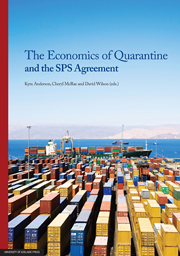Book contents
- Frontmatter
- Contents
- List of tables, figures and boxes
- Acronyms
- Preface
- List of contributors
- 1 Introduction
- PART I The multilateral rules under WTO
- PART II The ‘appropriate level of protection’
- PART III Adding more economics to risk analysis
- PART IV Specific health and environmental risks from trade
- 15 Measuring the effect of food safety standards on African exports to Europe
- 16 GMOs, the SPS Agreement and the WTO
- 17 Food safety policy in the WTO era
- 18 Environmental risk evaluation in quarantine decision making
- PART V Conclusion
- APPENDIX The legal text of the SPS Agreement
15 - Measuring the effect of food safety standards on African exports to Europe
from PART IV - Specific health and environmental risks from trade
Published online by Cambridge University Press: 05 June 2013
- Frontmatter
- Contents
- List of tables, figures and boxes
- Acronyms
- Preface
- List of contributors
- 1 Introduction
- PART I The multilateral rules under WTO
- PART II The ‘appropriate level of protection’
- PART III Adding more economics to risk analysis
- PART IV Specific health and environmental risks from trade
- 15 Measuring the effect of food safety standards on African exports to Europe
- 16 GMOs, the SPS Agreement and the WTO
- 17 Food safety policy in the WTO era
- 18 Environmental risk evaluation in quarantine decision making
- PART V Conclusion
- APPENDIX The legal text of the SPS Agreement
Summary
Many of the most important food safety issues in international trade today impact on developing countries. These countries, especially those in Sub-Saharan Africa, seek to expand access to international agricultural markets and integrate more fully into the global trade system. Questions of how to balance risk, expanding trade in agricultural products, and health concerns are at the forefront of trade debate. This chapter provides a case study of trade between Africa and Europe in agricultural products, from African exporters perspective. It presents results from empirical data and analysis on the trade effect of harmonisation of food safety standards within the European Union which we offer as a contribution to trade policy discourse on SPS standards and the multilateral trading system.
Concern about the health risks of food and appropriate sanitary standards has been increasing in industrialised countries over the past decade (Pinstrup-Andersen 2000). Debate over food safety has been especially prominent in Europe (Nielsen and Anderson 2000). The use of import bans and regulatory intervention by the European Commission is increasingly justified, in part, under the ‘precautionary principle’ which seeks to mitigate against risk even under conditions in which science has not established direct cause and effect relationships. The European Commission's approach has been challenged in trade policy talks, therefore, on the basis that import restrictions have been employed without sufficient support from internationally recognised science.
- Type
- Chapter
- Information
- The Economics of Quarantine and the SPS Agreement , pp. 287 - 304Publisher: The University of Adelaide PressPrint publication year: 2012

